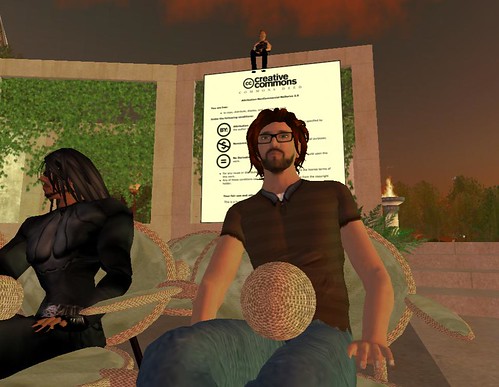The good people at Digiplay have wikified their game bibliography.
I can’t say that I like the interface much, but I love the BibTex integration and the RSS feed (in good Web 2.0 spirit we show the latest additions on the front page of Game Research).
2074 references entered, and counting.
Tag: Opslag
Game Research summit at ITU, 6 December
Playing the Field: An interdisciplinary game researchers’ summit
ITU; Dec. 6th, room: Aud. 3, 2nd floor.
14:00 Edward Castronova: “Why is this talk so boring?”
14:40 Bart Simon: “Digital Gaming and Local Practices of Social Imagination:
A Report from the Montreal GameCODE Project”
15:20 Coffee break, machine in 2D
15:40 Ian Bogost: “Platform Studies: computers and other neglected topics in
game research”
16:20 short break
16:30 Panel discussion: Where are “we” going? And how?
Second Life: Fad or Future?
SecondLife Concert 004 – Coulton in Audience, originally uploaded by AiYume.
I wouldn’t know, exactly, but I did utter some words in sequence on national radio (P1 Morgen) this morning on the topic of virtual worlds – check it out.
Jane McGonigal lectures at ITU, 30 November
The Center for Computer Games Research (game.itu.dk) is happy to
present:
Jane McGonigal, a world-leading ubiquitous game designer and researcher.
She will lecture at ITU on November 30th (16:15, Auditorium 2)
The title of her presentation is “This Might Be a Game! Pushing the
limits of ubiquitous play”
For more details about her talk and bio, see:
http://game.itu.dk/events/mcgonigal.htm
For any enquiries, please contact Gonzalo Frasca at frasca@itu.dk
The lecture series are an event of the Center for Computer Games
Research – game.itu.dk
IT University of Copenhagen
Open teaching positions at ITU (mostly for the Danes)
We have a small series of open ‘external lecturer’ positions at ITU.
Briefly, we’re looking to man the courses Usability, Digital Culture, Social Software: Design and Implementation, and System Architecture.
The job posting is in Danish, but English speakers could apply as well (let me know if you need translation help).
First European symposium on Computer Games and Emotions
… will be held at ITU on Monday 27.11.2006.
From the official page:
Monday November 27th 2006, 8:30-16:15
IT University of Copenhagen, Rued Langgaards Vej 7, 2300 Copenhagen s, Auditorium 2. How to get here.
The emotional dimension of computer games has has in the recent years became a popular focus for game research and development. While new games appear dubbed as “emotional rollercoaster rides”, academic research projects attempting to understand games and emotions pop up on the fields of game studies, psychology and HCI, to name a few. Even if one does not subscribe to David Freeman’s statement that the next revolution in games is emotional, the topicality of emotions as both a subject and an approach for computer games research seems evident.
Continue reading First European symposium on Computer Games and Emotions
Paper on role-playing game communication out
I wrote a paper with Anders Tychsen, Michael Hitchens and Susana Tosca which is now published:
Tychsen, Anders & Smith, Jonas Heide & Hitchens, Michael & Tosca, Susana. Communication in Multi-Player Role Playing Games – The Effect of Medium. Technologies for Interactive Digital Storytelling and Entertainment (Lecture Notes in Computer Science). Berlin: Springer Verlag.
Abstract: The Pen-and-Paper role-playing game is a successful example of collaborative interactive narrative. Meanwhile, computer-based role-playing games, while structurally similar, offer quite different narrative experiences. Here results are presented of an experimental study of role-playing gamers in Pen-and-Paper and computer-supported settings. Communication patterns are shown to vary significantly on measures such as the share of in-character statements and the share of dramatically motivated statements. These results are discussed in the light of differences between the two gaming forms and finally some design implications are discussed.
Find it at Springer or, if you don’t have access, try this version.
Interesting article on player rating
I rambled a bit below on player rating systems. On that note we have a (much more) interesting new article on Game Research about Trust, Cooperation, and Reputation in Massively Multiplayer Online Games by Tony Tulathimutte.
powered by performancing firefox
Game lecture: Aki Järvinen to speak at ITU tomorrow
The Center for Computer Games Research (game.itu.dk) is happy to announce its Game Lecture Series for Fall 2006.
The next lecture will be given by Aki Järvinen, from the Finnish
National Lottery, who will present his research on applied ludology.
It’ll take place on October 12, 2006 at 16:15 at the IT University of
Copenhagen (Rued Langgaards Vej 7, Copenhagen 2300 S). Entrance is free
and everybody is welcomed.
Details about the talk can be found here:
http://game.itu.dk/events/jarvinen2006.htm
For any enquiries, please contact Gonzalo Frasca at frasca@itu.dk
No end to the achievements of former ITU man
Let it be known that justly famous former colleague Troels Folmann‘s Tomb Raider: Legend soundtrack just recieved a BAFTA award for original score. Troels, we never doubted you, and of course we are considering how to claim some of the credit :-). Some examples.


